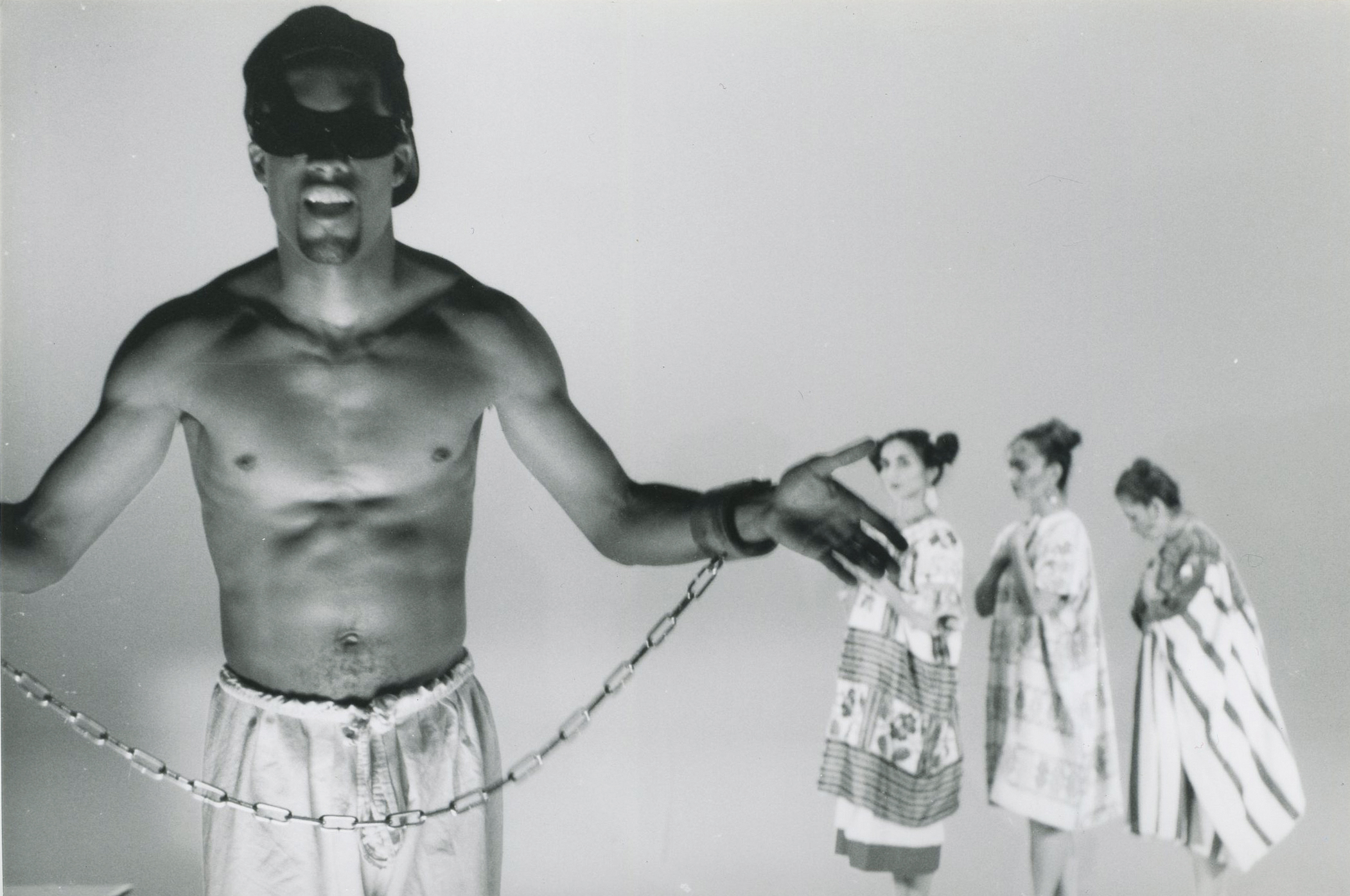Lourdes Portillo Looks Inward

ABOVE: A STILL FROM LOURDES PORTILLO’S COLUMBUS ON TRIAL (1993). IMAGE COURTESY OF WOMEN MAKE MOVIES
Through June 30, MoMA presents La Cineasta Inquisitiva, a retrospective of the works of Academy Award-nominated filmmaker Lourdes Portillo. Born in Mexico and raised in Los Angeles, much of her work looks at Latin American, Mexican, and Chicano culture. Best known for films such as the 1985 documentary Las madres de la Plaza de Mayo, Portillo’s work possesses a rare emotional caliber, and subjects that range from the disappearance of 350 kidnapped and murdered young women from Juárez, Mexico in 2001’s Senorita Extraviada, to the cultural exploration of commercial icons like Steve McQueen and Latin pop sensation Selena.
When we spoke to Portillo before the opening of her New York museum retrospective, the filmmaker offered insight into the process of creating lasting work and continuing to pursue challenge in her craft after a career spanning three decades.
RYANN DONNELLY: When were you approached about the retrospective?
LOURDES PORTILLO: A couple months ago; it’s pretty exciting.
DONNELLY: Can you talk about how you start a project?
PORTILLO: I have different interests, and what happens with making a film is that you’re going to live with it for a long time, so it better be something that has some staying power. I’m usually inspired by—it could be anything. In one instance, one of the things I was inspired by was something that was happening in my family—the drama that happens in a family, or an unsolvable crime, like Senorita Extraviada.
DONNELLY: When you talk about your family, are you talking about The Devil Never Sleeps?
PORTILLO: Yeah.
DONNELLY: How did that project come about?
PORTILLO: I received a phone call from my mother, and it was so complicated and involved, and it reminded me of just how it is in a family, and how it is in Mexico, and gossip, and all this stuff. And I thought, well, why can’t a documentary be made about gossip? And in that way, I touch upon these other things—identity, cultural identity, and aesthetics.
DONNELLY: How do you perceive your work outside of these labels?
PORTILLO: I think what happens is that “identity” is used as a catch-all for people of color in this country. But my films have to do with justice and many, many other concerns. That’s the sad part of coming from my generation, and having been boxed in by those words like “identity.”
DONNELLY: You’ve worked in a broad range of genres. Do you attribute the transitions in your work to anything in particular?
PORTILLO: Yeah, I’ve done experimental work, I’ve done real conventional documentaries that were very successful, like Las Madres that was nominated for an Academy Award. And, from that moment on I felt like, “Okay, I can make that. Now where am I going to go?”
DONNELLY: So you enjoy that challenge?
PORTILLO: I do, I love that challenge. I love the challenge of trying to play with the form, and not adhering—in this way where you feel like you can’t move—to documentary. Documentary can be many things, and that has really been my journey.
DONNELLY: Did you find it challenging to document a subject like Selena that already had an established commercial identity?
PORTILLO: Well, yes, she was known, but she wasn’t known to everybody. And I took my experience with Selena as kind of a notation of what the film should be about. I was surprised that Selena became so famous, and that she was brown. At that moment in history, that was not happening. It happened afterwards.
DONNELLY: When did you become aware of her?
PORTILLO: It was just before she was killed that I walked into the living room of my parents’ house, and my mother and father were saying, “Come, come, come, listen to this girl sing, she has a beautiful voice.” And I remember I went and looked, and it was this brown girl, and it was shocking. It was shocking. And now we don’t see it like that, but it was then. I followed her from that moment on, and when she was killed it was a terribly sad thing, because by that moment there were all these girls that were identifying with her, and [she was] giving them her power.
DONNELLY: Was your interest in film coming from other directors’ work, or was it that you had interest in documenting these particular subjects that were inspiring you?
PORTILLO: I think I looked to many, many filmmakers. I was influenced by the Neo-Realists, and by the Cuban, and the Latin American cinema, the ’70s, European experimental work. And fortunately, all those influences gave me the strength to think, “I can make my way. I’m a creative person, I can try to create a way that is uniquely mine because I’ve seen so much, and I’ve experienced so much.”
DONNELLY: So you weren’t just trying to give Steve McQueen a run for his money?
PORTILLO: [laughs] Right.
DONNELLY: Your film My McQueen has such love and hate for Steve McQueen. Do you feel that for today’s Hollywood actors?
PORTILLO: No, I actually love actors. That film particularly was hard to make, because my father was dying. I see it, and I see my confusion, my pain, my everything. I thought that it was really interesting to be able to put the people from behind the camera in front of the camera as they make it.
DONNELLY: What are you working on next?
PORTILLO: Right now I’m making a kind of a memoir of certain aspects and times in my life. Now that I’m older I can look back and analyze some things, and see the root of things. I’m trying to do that with very old Super 8 and 8-mm footage.
DONNELLY: Footage of you?
PORTILLO: Of me, yes. Well, it’s not clear. I’m in the process of creating, so that’s what I’m saying now, but maybe in a year I’ll tell you something else. I’ve been working on it for about a year, and I’ve been collaborating with the artist Andrew Benson. We’re trying to create imagery that is Internet-based—some of it, not all of it. It’s beautiful to work with a younger person.
DONNELLY: Does narrative have any appeal to you?
PORTILLO: Oh yeah, it does.
DONNELLY: You mentioned how much you love actors, and yet you don’t include so many actors in your films.
PORTILLO: Well, this is strange to say, but even though I make documentaries, everyone’s acting in a way. Really. And you’re creating, and you’re confabulating things. You can’t relive reality, you can just present it. And that’s what I do. I have worked with actors and I like it very much, so maybe. I think that would be wonderful to do something like that, as well.
DONNELLY: Anything else?
PORTILLO: I’m doing a lot of research right now on what’s happening in Arizona. That’s where I’m at with more conventional documentary filmmaking. I think it is an urgent cause. I think I need to make something. I’m a part of it. Everybody’s a part of it, and this country needs to know what’s happening there in a very truthful way.
LA CINEASTA INQUISITIVA IS ON VIEW AT MOMA THROUGH JUNE 30.






